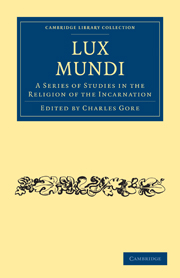Book contents
- Frontmatter
- ESSAYS AND CONTRIBUTORS
- PREFACE
- PREFACE TO THE FIFTH EDITION
- PREFACE TO THE TENTH EDITION
- Contents
- I FAITH
- II THE CHRISTIAN DOCTRINE OF GOD
- III THE PROBLEM OF PAIN
- IV PREPARATION IN HISTORY FOR CHRIST
- V THE INCARNATION AND DEVELOPMENT
- VI THE INCARNATION AS THE BASIS OF DOGMA
- VII THE ATONEMENT
- VIII THE HOLY SPIRIT AND INSPIRATION
- IX THE CHURCH
- X SACRAMENTS
- XI CHRISTIANITY AND POLITICS
- XII CHRISTIAN ETHICS
- APPENDIX I ON SOME ASPECTS OF CHRISTIAN DUTY
- APPENDIX II ON THE CHRISTIAN DOCTRINE OF SIN
IV - PREPARATION IN HISTORY FOR CHRIST
Published online by Cambridge University Press: 29 August 2010
- Frontmatter
- ESSAYS AND CONTRIBUTORS
- PREFACE
- PREFACE TO THE FIFTH EDITION
- PREFACE TO THE TENTH EDITION
- Contents
- I FAITH
- II THE CHRISTIAN DOCTRINE OF GOD
- III THE PROBLEM OF PAIN
- IV PREPARATION IN HISTORY FOR CHRIST
- V THE INCARNATION AND DEVELOPMENT
- VI THE INCARNATION AS THE BASIS OF DOGMA
- VII THE ATONEMENT
- VIII THE HOLY SPIRIT AND INSPIRATION
- IX THE CHURCH
- X SACRAMENTS
- XI CHRISTIANITY AND POLITICS
- XII CHRISTIAN ETHICS
- APPENDIX I ON SOME ASPECTS OF CHRISTIAN DUTY
- APPENDIX II ON THE CHRISTIAN DOCTRINE OF SIN
Summary
The paradox of Divine mystery implied in the words ‘The Word was made flesh,’ is not exhausted by a right understanding of the Person of Christ. It extends to the relations between Christ and History. On the one hand, the Incarnation of the Son of God appears as supreme, solitary, unique, transcending all analogies of experience, all limitations of nationality or generation, determined before the world was, beyond the power, of any antecedents to produce, the entry of a new thing into the world. It appears, in short, as a miracle. But, on the other hand, it appears as an historical event, occurring at a particular date, appealing to the feelings and fulfilling the hopes of the time, a climax and a new point of departure in the historical order. It does this, necessarily, because this is involved in the act of taking flesh, of entering simply, literally, naturally into the conditions of human life. Such a thing occurs, and must occur, in the natural order. To say this is not to dictate what a Divine revelation must be, but only to shew what Christianity asserts of itself. In this way it was good in God's sight that His revelation should come.
It follows from this, in the first place, that there must be two ways, both valid and necessary, of approaching in thought and study Christ manifest in the flesh.
- Type
- Chapter
- Information
- Lux MundiA Series of Studies in the Religion of the Incarnation, pp. 93 - 131Publisher: Cambridge University PressPrint publication year: 2009First published in: 1889



